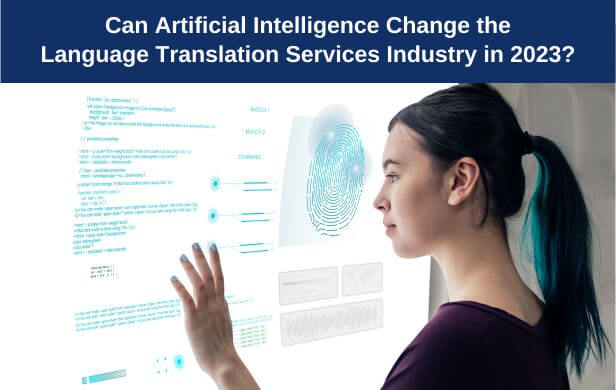
The advent of artificial intelligence (AI) has undeniably brought significant advancements to various industries, including language translation services. With AI-powered translation tools becoming increasingly sophisticated, it is worth examining whether AI has the potential to revolutionize the language translation industry in India.
The future of translation is an exciting and rapidly evolving landscape driven by technological advancements and changing global dynamics. Several key trends are shaping the future of translation:
Neural networks and deep learning have significantly improved machine translation quality. NMT models can better understand context, produce more fluent translations, and handle a wider range of language pairs. As NMT continues to improve, it will become an essential tool for translators, assisting them in their work and increasing overall translation efficiency.
Translation tools are becoming more customisable, allowing users to fine-tune models based on specific industries, domains, or individual preferences. This customisation enables more accurate and tailored translations, particularly in specialized fields with unique terminology and jargon.
AI-powered translation systems will continue learning and improving. With large amounts of data being generated daily, these systems can continuously update their knowledge and adapt to evolving language patterns, cultural shifts, and new terminology. This ongoing learning process will lead to more accurate and up-to-date translations.
The future of translation also focuses on ethical considerations and inclusivity. There will be increased attention to ensuring translations are culturally sensitive, respectful, and accurately represent diverse perspectives. Translators will be crucial in navigating these ethical challenges and ensuring that translations promote understanding and inclusivity.
While AI and machine translation tools have their advantages, human translators are still preferred to be in the loop for some critical domains like medicine, pharmaceutical, patents, law, literature, etc.for foreign language translation services.
Contextual Understanding: AI translation systems often struggle to grasp the nuances of language, including cultural references, idioms, and humour. These linguistic subtleties can significantly impact the meaning and intent of a text, making it challenging for AI to provide accurate translations.
Language frequently contains words or phrases with multiple meanings, and disambiguating the correct interpretation requires a deep understanding of context. AI systems may struggle with disambiguation, leading to inlized Languages: AI translation models rely on vast amounts of training data, typically available for widely spoken languages. Data scarcity poses a significant challenge for less common or specialised languages, limiting the accurate or misleading translations.
Rare and Special Accuracy and availability of AI translations in these domains. Much more research and development needs to be done for automating the Indian language translation services considering the lack of training data available in these languages, and due to the human ability to understand and navigate the linguistic complexities, cultural nuances, and context-specific requirements of translation.
Translating involves not only the conversion of words but also the preservation of the source text's original tone, style, and intention. AI may fall short in accurately replicating these subtleties, potentially resulting in translations that lack the appropriate emotional or cultural resonance.
Translators at Language Services Bureau possess cultural and linguistic expertise that goes beyond simple word-to-word translation. They understand the context, idiomatic expressions, and cultural sensitivities required to accurately convey a text's true meaning.
Many specialized fields, such as legal, medical, or technical translations, demand a deep understanding of the subject matter. Human translators with expertise in these domains can accurately capture and convey complex concepts and terminology, ensuring accurate and contextually appropriate translations.
Language is not a static entity but evolves continuously. Human translators can adapt to new linguistic trends, cultural shifts, and changes in language usage, allowing them to provide relevant and up-to-date translations.
Human translators bring a critical eye to their work, reviewing and refining translations to ensure accuracy, clarity, and coherence. They can identify and rectify any errors or inconsistencies that might arise during the translation process, delivering a polished final product.
Conclusion:
While AI has undoubtedly made significant strides in the field of translation, it still falls short in several key areas. Human translators' contextual understanding, cultural nuances, and subject matter expertise remain invaluable in delivering accurate and high-quality translations. In the future, human translators will stay an intrinsic part of the translation process, as editors or revisers if not as translators, to yield the best results, where AI tools assist human professionals in their work. By leveraging AI's efficiency and speed alongside Language Services Bureau’s expertise and creativity, we can continue to evolve and provide increasingly accurate and contextually appropriate translations in 2023 and beyond.
For any queries related to language translation services. Inquire at our email address below or give us a call today!
info@languageservicesbureau.com
Telephone: +91-20-24470509, +91-82370 60559
Similar articles for you...

आमच्या गेल्या महिन्यातील ब्लॉग मध्ये भाषांचे ज्ञान आवश्यक असणाऱ्या करियर क्षेत्रांची माहिती आपल्याला मिळाली. जिथे भाषेचे ज्ञान फायद्याचे ठरते असे इतर व्यवसाय आपण या महिन्यात पाहुयात.

Posted by : Language Services Bureau

The time it takes to learn a language depends on what you want to do with it– here is a great article about language learning and the kind of expectations you can set about the time required for the same!